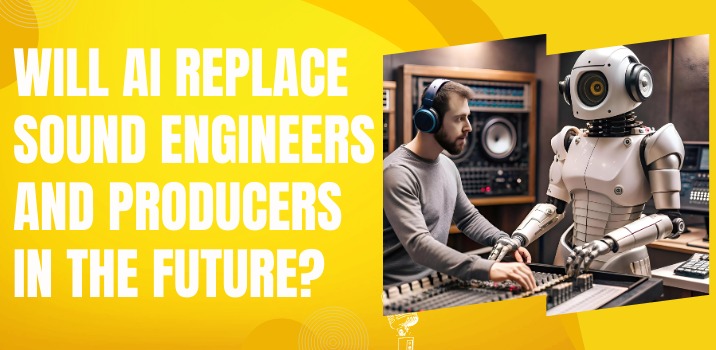Will AI Replace Sound Engineers and Producers in the Future?

25-September-2024
There’s a lot of talk these days about how AI is changing the music industry. With AI-powered tools getting smarter, some people are wondering: Will AI replace sound engineers and producers? Especially for those of you searching for record studios near me to bring your music to life, don’t you think that the human element still matters? But here’s the big question: will these advancements eventually replace the human professionals behind the magic to record a song? Let’s break it down in simple terms and explore what’s happening.
Famous Producers Using AI Right Now
Before we jump to conclusions, it's important to know that some of the world’s top producers are already using AI tools, not to replace their work, but to enhance it. For example, Grammy-winning producer Taryn Southern created her entire album *I AM AI* with the help of an AI platform called Amper. She used AI to help generate the music, but the creative decisions were still very much hers. Another big name is David Guetta, who famously used AI to recreate a vocal track in the style of a legendary rapper for one of his performances.
These producers aren’t letting AI take over to record a song; they’re using it as a tool to expand their creativity, make their workflow faster, and experiment with new sounds.
The Most Popular AI Tools Right Now
There are several AI tools that sound engineers and producers are using today. Here are some of the most well-known ones:
1. Amper: This tool helps create music tracks by inputting parameters like mood, genre, and tempo. It’s often used to speed up the process of creating background music for videos or ads.
2. AIVA (Artificial Intelligence Virtual Artist): AIVA can compose entire pieces of music on its own. It’s often used by creators who need quick music, like for video game soundtracks or commercials.
3. LANDR: One of the most popular AI mastering tools, LANDR analyzes a track and masters it automatically. For many, it’s an affordable and quick solution, but it's not a full replacement for a human mastering engineer.
4. Endlesss: This is more of a collaborative tool that lets musicians create loops and riffs with AI, and then share them with other artists in real-time. It’s becoming popular among electronic music producers.
While these tools are impressive, they don’t completely replace the human element. Professionals whose work involves searching for record studios near me and using them to capture the best of their acts are now thinking twice before starting with a new masterpiece. They’re great for helping with repetitive tasks or offering new ideas, but they don’t yet match the intuition and artistry of a trained producer or engineer.
The Downsides of Using AI in Music Production
Even though AI tools are helpful, they have their limitations. Here are a few reasons why AI hasn’t taken over the music world just yet:
- Lack of Human Emotion:
- Creativity Gaps:
- Customization Challenges:
So, Will AI Replace Sound Engineers and Producers?
AI is definitely making big changes in the music industry, and it’s here to stay. But will it completely replace sound engineers and producers? Not likely. These tools are becoming powerful assistants, helping professionals work faster and offering new possibilities for creativity. However, the core of music production creativity, intuition, and emotional depth still come from humans.
If you are still asking yourself how AI could affect the future of your music for which you spent hours searching for record studios near me, perhaps, consider our services at UNION Recording Studio. You will get guidance on using the AI potential to record a song and still stay people-centric. In the end, AI can’t fully replace the human touch. It can assist, streamline, and even inspire, but it’s the human ear and heart that makes music truly impactful. So rather than seeing AI as a threat, sound engineers and producers can use it as a tool to push their work to new heights.